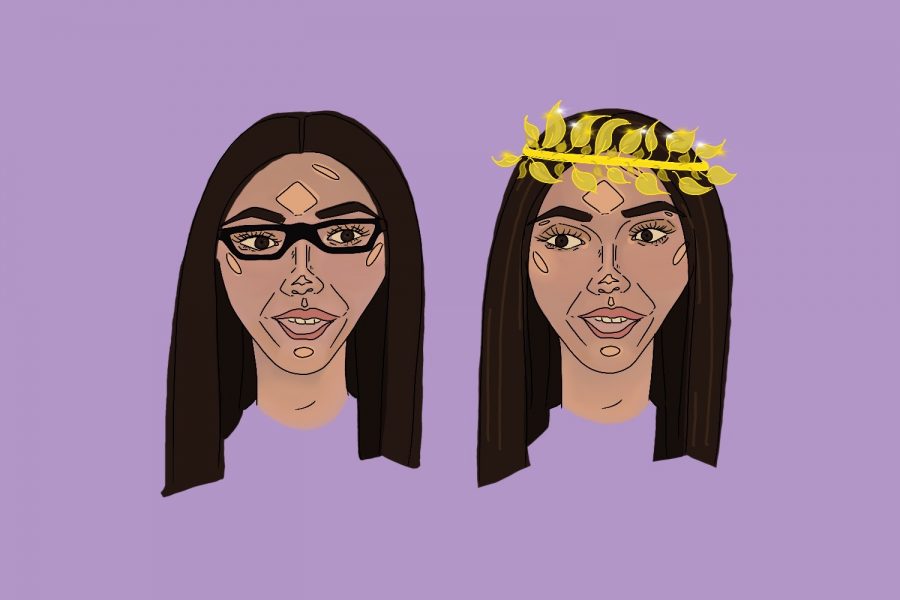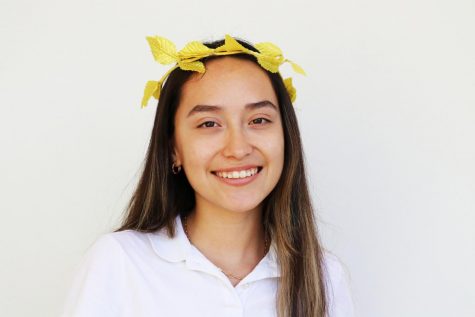Column: My complex relationship with Archer
Photo credit: Leslie Castaneda
An artistic illustration by senior Leslie Castaneda shows Celeste speaking to her younger self. The image portrays the reflective nature of her column, where she writes about what she has learned about identity during high school. After three years, this is her final addition to the Oracle.
May 21, 2020
Before I sat down to write this final column, the last addition to my three years on the Oracle, I went all the way back to read my first ever piece, “Latina Girl in an Archer World.” In the column, I reflected on my first year at Archer, specifically my transition to Archer and the culture shock I experienced coming to a predominantly white institution (PWI). I talked about being confronted with questions about identity and belonging in a way I had never had to deal with before.
As I grew up over the past few years, this column became a continuation of that first reflection. It was the place where I wrote about what was on mind and the topics I found myself talking about with friends and family or in class. It has become my big (public) journal. As time went on, I became more and more comfortable with being more vulnerable, personal and assertive. I began to not shy away from asking myself and my readers hard questions.
Although I still agree with my first column and think that my freshman year was one of the most transformative experiences of my life, there was definitely more to that story. My younger self wanted a solution by the end of the piece. I don’t know if it was because it was my first column and I wasn’t sure how much to share, if I wanted a happy ending for the sake of the viewers (or even myself) or something else, but I don’t think I had fully wrapped my head around just how overwhelmingly complex and ever-changing identity is. That is arguably the most important lesson I have learned at Archer.
Back then, it was easier to think that the hardest part was over, but as this column and these past few years have shown me, there are countless questions we have not even asked ourselves, and for most, we don’t even have the answer. The more you learn, the more questions you have. I feel like in most of my columns, I don’t even have a concrete stance by the conclusion because I realize there are too many factors to consider.
The most significant example that I can think of is my complex, ambiguous relationship with Archer. As I discussed in my first column ever, navigating “in-between” two vastly different worlds — home and school — created many tensions within my identity. I have continued to deal with that strain throughout the entirety of high school.
For example, Archer was the first place that really empowered me as a woman and taught me about topics like feminism, intersectionality and social justice. That influence motivated me to put myself out there and do things like write this column, lead clubs, join the student Diversity Conference Leadership Team (DCLT), etc. It also exposed me to progressive political beliefs and sparked ideas for what I want to do in the future.
However, these ideas conflicted with my family and community’s traditionally conservative values. It revealed the prominent machismo in my community, the prejudice I grew up when it came to topics of gender, sexuality, etc. and the fact that politics weren’t exactly the most popular dinner table discussion. As I began forming my own political beliefs and talking about them in conversations, I began to be labeled as the stereotypical, “angry” liberal by my community back home. This sometimes led to negative feelings of exclusion and being misunderstood.
Similarly, Archer also introduced me to the importance of social-emotional learning and mental health. It has played a huge role in my experience with confronting my own mental health issues during high school. However, although it has bettered a bit, this topic remains a taboo in my family and community.
However, navigating in between these two worlds hasn’t only revealed negative aspects of my home and community. I have also felt the strain of Archer’s high stress, competitive environment as well as it being a PWI. The harsh truth is that at Archer, for the first time in my life, I became aware of my racial/ethnic identity and its implications. I was exposed to concepts like white privilege and race/class inequalities, so I felt the strains of my lower socioeconomic class and being a first-generation student.
I was also confronted with many different types of pressures: pressures to assimilate, pressures to represent a minority group of people and pressures to “prove myself.” I have definitely learned how to better cope with these pressures in the last few years, but it will remain a struggle.
There is also the newfound tension between my community and the life I’m trying to create for myself in the future. Especially as I go to college — to another PWI — I’m questioning how I define success and how I feel about constantly going to predominately white environments to get this supposed “success.” This is something that I thought about even while attending Archer. I’ve always been uncomfortable with the fact that I went out of my community to attend Archer and get a “better education.” What does that imply? Am I turning my back on my community back home?
I feel like I could write an individual column about all of the topics I brought up above, and I want to continue to explore them, but we, unfortunately, don’t have any more time left before I graduate.
Now, these are all questions I still have and will most likely continue to have. I have not been able to reconcile these tensions, but these past four years at Archer have taught me that that is okay. I understand that my multifaceted identity will continue to change.
In the end, my experiences at Archer have shown me that I’m not inferior in either environment, I’m just different. I’ve learned to be open-minded, to consider all aspects of any situation and to openly express my opinions because they truly matter. I know how to be respectful and kind but assertive and willful as well. It has all made me proud of my intricate, beautiful identity.
So, as I sign off from the Oracle, I can’t say I have it all figured out, but I can say I feel ready and excited to continue growing. I’ll take everything all of you have taught me over the last few years, the good and the bad, and for that I am grateful. From the bottom of my heart, thank you — and this isn’t a goodbye, it’s a see you later.










Beth Gold • May 23, 2020 at 8:11 am
Another thought provoking and enlightening piece Celeste. Thanks for your honesty and the insight into your journey navigating identity at Archer. As you know, your pieces have been powerful talking points for my classes and I can’t thank you enough for helping us all learn more about the complexities of experiences within our own walls.
Cybele • May 22, 2020 at 1:34 pm
Ditto on everything Maya said! Still remember that first article soooo clearly. Thanks for being vulnerable and sharing your well written thoughts these past three years! Definitely left your mark on Archer!!
Gracie Wilson • May 22, 2020 at 1:28 am
I am so so sad that I no longer will have your columns to look forward to each month, but I hope you continue writing at Barnard and send your work to the class of 2020. I know how much your wisdom and sharing has meant to us and the community!
Isabella Terraciano • May 22, 2020 at 12:44 am
Celeste, you have contributed so much to the Archer community during your time here by sharing your voice. I’m so excited for you to continue writing and exploring your identity in college and I can’t wait to see you continue to succeed in the future.
Ms. Chakaravarty • May 21, 2020 at 8:18 pm
Celeste, though I’ve never had you in class I have enjoyed getting to know you by reading your articles for the Oracle. I will miss hearing your thoughts in this forum, and.I hope that you keep writing and publishing your work.
Anna Brodsky • May 21, 2020 at 8:11 pm
Celeste, your column has been such a gift to the Oracle, and your presence has been such a gift to Archer. I’m a better person because of your writing, and I can’t thank you enough for sharing your wisdom with all of us for these past three years. I can’t wait to see how you bring your powerful voice out into the world!
Lexie H Ben-Meir • May 21, 2020 at 7:31 pm
Celeste, this is so incredible. You have given so much to the Archer community through your writing, touching on subjects that we all truly need to hear. Thank you for your vulnerability, wisdom, and passion. I’m going to miss you so much!
Andrea Ramirez • May 21, 2020 at 5:23 pm
SOO BEYOND PROUD!
Sophie Larbalestier • May 21, 2020 at 5:17 pm
Amazing article, Celeste. I am going to miss reading your columns (please send me everything you write next year for Barnard!!). Can’t wait to see all you’ll accomplish.
Ms. Janssen • May 21, 2020 at 5:16 pm
Powerful article, Celeste. Thank you!
Maya Wernick • May 21, 2020 at 12:56 pm
I’m so proud of you, Celeste! Thank you for all of the work, emotional and otherwise, that you have put into your columns. I remember reading and editing that very first one and just knowing that you were going to bring something incredibly special to the Oracle. And while my expectations were high then, you have surpassed them time after time. The Oracle is better because of you and I cannot wait to see how your journey continues!